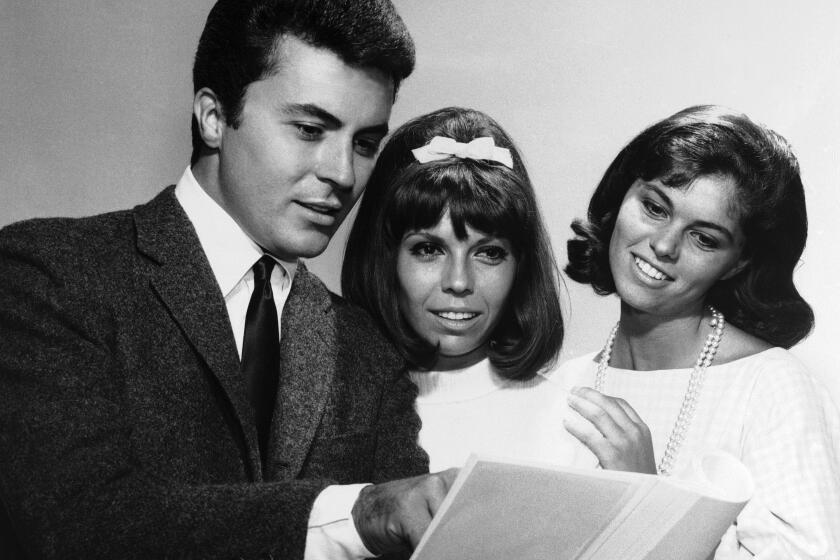Review: Bleak beauty of Jean-Pierre Melville’s ‘Army of Shadows’ revealed in full
French director Jean-Pierre Melville is best known for elegant, haunting gangster melodramas like “The Red Circle,” “Bob Le Flambeur” and the dazzling “Le Samourai.” But the films he felt closest to were the ones he made about the transformative experience of his life, the years he spent in the French Resistance during World War II.
The greatest of these, 1969’s “Army of Shadows,” returns to the screen for one week (at Laemmle’s Ahrya Fine Arts in Beverly Hills) in a beautiful new digital restoration that emphasizes the severe beauty of both its bleak, muted color and the desperate lives of its protagonists.
SIGN UP for the free Indie Focus movies newsletter >>
Made with the confidence and skill of a master director working at the peak of his powers, “Army of Shadows” is so uncompromising it took Melville 25 years to get it made and, once completed, saw 37 more years pass before it secured an American theatrical release in 2006.
Based on a memoir by Joseph Kessel and opening in October 1942, “Army of Shadows’” low-key tone emphasizes the unheroic nature of heroism, its undramatic matter-of-factness. It gives a sense of the nerve-racking combination of tension and boredom involved, of the life and death decisions that were made, of the enormous sacrifices that sometimes accomplish nothing at all.
Though it has some of the trappings of Melville’s thrillers, from clandestine meetings to fast cars on lonely roads, it is also a meditation on the nature of resistance and the price of courage. It’s not that Melville doesn’t believe his protagonists were heroes; he very much does. It’s that this director’s reserved ideas of heroism were poles apart from the way films ordinarily portray it.
In addition, “Army of Shadows” gives a sense of how savage and unrelenting the demands of wartime can be, and of how alone and hopeless those who commit to action can feel. History may glorify them now, but at the time these individuals despaired of their frailties and worried they were not doing enough.
Melville begins “Army of Shadows” with a bravura sequence that the director called one of only two shots he was really proud of in his entire cinematic career.
With a fixed camera focused on a deserted Arc de Triomphe in the heart of Paris, the shot begins with the sound of marching feet off-screen. Then we see a distant column of German soldiers entering from the left and turning at the Arc to walk, implacable and unswerving, straight toward the camera.
Not only was this an almost impossible shot to get government approval for — actors in German uniforms were banned from the Champs-Élysées — it manages to encapsulate the trauma of occupation in one startling image that works on an emotional level that no print description can duplicate.
As monumental as the Arc is the performance of Melville regular Lino Ventura as central character Philippe Gerbier, a prominent civil engineer we meet in October 1942 being transported to a prison camp. An actor of great contained presence, Ventura plays a man of great mental and physical strength who must keep things under wraps to function effectively in the shadows.
“Army of Shadows” is constructed as a series of set pieces following Gerbier and other individuals linked in a loose network. It conveys incidents that both actually happened and were conceived by Melville as symbolic of the range of Resistance activities.
These include time spent in the prison camp, a sudden escape from a hotel used as a German headquarters, even the awkward execution of a traitor by people who never thought executing anyone would be part of their life experience. At a certain point Simone Signoret enters the picture as the resourceful Mathilde, a woman whose life was irrevocably altered, as everyone’s was, by her participation.
As someone who was part of the Resistance himself, Melville was determined not to glorify or devalue the heroism he presents. This is what it looked like moment to moment, day to day, “Army of Shadows” says. This is the way it was.
------------
‘Army of Shadows’
For the Record
November 20, 5:48 a.m.: The photo caption in an earlier version of this story incorrectly stated that this is the film’s U.S. premiere.
MPAA rating: None.
Running time: 2 hours, 25 minutes
Playing: Laemmle’s Ahrya Fine Arts, Beverly Hills
More to Read
Only good movies
Get the Indie Focus newsletter, Mark Olsen's weekly guide to the world of cinema.
You may occasionally receive promotional content from the Los Angeles Times.








